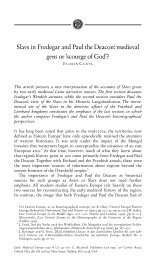A READER IN COMPARATIVE INDO-EUROPEAN MYTHOLOGY
A READER IN COMPARATIVE INDO-EUROPEAN MYTHOLOGY
A READER IN COMPARATIVE INDO-EUROPEAN MYTHOLOGY
Create successful ePaper yourself
Turn your PDF publications into a flip-book with our unique Google optimized e-Paper software.
In a number of traditions, the origin of the world – either in its physical or in its social aspect<br />
– is connected with the myth of the „twin“ (PIE *yemo- > Skr. yama-, Av. yima-, Latv. jumis,<br />
ON Ymir, perhaps also Lat. Remus (if from *yemos on the analogy with Romulus). This<br />
primeval twin has, in all appearances, nothing to do with the divine twins, the sons of the sky<br />
(see above). In th Norse myth (Grīmnismál 40-41) the giant Ymir is dissected and the<br />
mountains are formed from his skull, the trees from his hair, etc. Tacitus (in Germania, 2),<br />
tells how the Germans believe that they originate from a primeval Tuisto (originally „twin“?),<br />
who had a son called Mannus „man“. This is reminiscent of the Vedic myth, where Yama was<br />
the first mortal to die, and he was subsequently given the rule of the Otherworld. His brother,<br />
Manu-, the progenitor of the humankind, sacrificed him. The legend of a miraculous birth of<br />
twins also lies in the legend of the foundations of Emain Machae, the ancient capital of Ulster<br />
in the Old Irish Ulster Cycle. The motif of the sacrificed twin may have its roots in the<br />
widespread infanticide of one of the twins in early societies, in which it was economically<br />
impossible for women to raise twins.<br />
OTHERWORLD<br />
There is no evidence for a consistent picture of the PIE otherworld. We do not know where it<br />
was, but it appears that the abode of the dead is reachable by boat, cf. OIr. tír inna mban,<br />
which is an island, as is the tech Duinn „the house of Donn“. Likewise, the island of Avalon<br />
in the British legend is the resting place of heroes, such as King Arthur (Welsh Arthwr). OCS<br />
navъ „the otherworld“ is derivable from the word for „boat“, PIE *neh2u- (Lat. nāvis, Skr.<br />
naú-, etc.), and in the Greek belief, one has to cross the river Styx to reach the otherworld.<br />
The idea that one crosses the river is here combined with the other one, namely that the realm<br />
of the dead is underground; in the Old Irish sagas, you enter it via the fairy mounds, the síd (<<br />
PIE *sēdos „seat“). In a few traditions we find the idea that the dead abide in a wonderful<br />
meadow, rich in horses, cf. Hitt. wēllu- „meadow (of the otherworld)“, Gr. (W)ēlýsion pedíon<br />
„Elysean fields“, RV 10.14.2: „this cow pasture is not to be taken away“, OIr. mag mell; in<br />
TochA the word walu „dead“ may be related, as well as ON val-höll „Valhalla“.<br />
In the Rig Veda, we find a belief that the realm of the deceased („the fathers“, pitaras) is in<br />
the sky, more precisely in the Milky Way (svarga-, which is compared to Gr. ólbios „blessed“<br />
< *swel-g w (H)o-).<br />
The otherworld may have been ruled by the original progenitor of mankind, *Yemo- (Skr.<br />
Yama-, Av. Yima-), see above.<br />
FIRE <strong>IN</strong> WATER (?)<br />
A mythological fiery protector of waters is reconstructed on the basis of Lat. Neptūnus, Skr.<br />
Apā́ m Nápāt (< *h2epom nepōt- „the descendant of water (ap-)“, identified with Agni, the<br />
fire), OIr. Nechtan (a mythical spouse of Boand, the river Boyne), cf. also ON saevar niđr<br />
„descendant of the sea“ (a kenning for „fire“). All of this, however, is on a very shaky soil.



